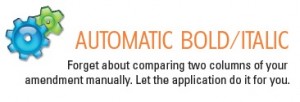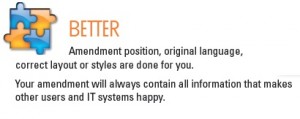VoxPopuLII
AT4AM – Authoring Tool for Amendments – is a web editor provided to Members of European Parliament (MEPs) that has greatly improved the drafting of amendments at European Parliament since its introduction in 2010.
The tool, developed by the Directorate for Innovation and Technological Support of European Parliament (DG ITEC) has replaced a system based on a collection of macros developed in MS Word and specific ad hoc templates.
Why move to a web editor?
The need to replace a traditional desktop authoring tool came from the increasing complexity of layout rules combined with a need to automate several processes of the authoring/checking/translation/distribution chain.
In fact, drafters not only faced complex rules and had to search among hundreds of templates in order to get the right one, but the drafting chain for all amendments relied on layout to transmit information down the different processes. Bold / Italic notation or specific tags were used to transmit specific information on the meaning of the text between the services in charge of subsequent revision and translation.
Over the years, an editor that was initially conceived to support mainly the printing of documents was often used to convey information in an unsuitable manner. During the drafting activity, documents transmitted between different services included a mix of content and layout where the layout sometime referred to some information on the business process that should rather be transmitted via other mediums.
Moreover, encapsulating in one single file all the amendments drafted in 23 languages was a severe limitation for subsequent revisions and translations carried out by linguistic sectors. Experts in charge of legal and linguistic revision of drafted amendments, who need to work in parallel on one document grouping multilingual amendments, were severely hampered in their work.
All the needs listed above justified the EP undertaking a new project to improve the drafting of amendments. The concept was soon extended to the drafting, revision, translation and distribution of the entire legislative content in the European Parliament, and after some months the eParliament Programme was initiated to cover all projects of the parliamentary XML-based drafting chain.
It was clear from the beginning that, in order to provide an advanced web editor, the original proposal to be amended had to be converted into a structured format. After an extensive search, XML Akoma Ntoso format was chosen, because it is the format that best covers the requirements for drafting legislation. Currently it is possible to export amendments produced via AT4AM in Akoma Ntoso. It is planned to apply Akoma Ntoso schema to the entire legislative chain within eParliament Programme. This will enable EP to publish legislative texts in open data format.
What distinguishes the approach taken by EP from other legislative actors who handle XML documents is the fact that EP decided to use XML to feed the legislative chain rather than just converting existing documents into XML for distribution. This aspect is fundamental because requirements are much stricter when the result of XML conversion is used as the first step of legislative chain. In fact, the proposal coming from European Commission is first converted in XML and after loaded into AT4AM. Because the tool relies on the XML content, it is important to guarantee a valid structure and coherence between the language versions. The same articles, paragraphs, point, subpoints must appear at the correct position in all the 23 language versions of the same text.
What is the situation now?
After two years of intensive usage, Members of European Parliaments have drafted 285.000 amendments via AT4AM. The tool is also used daily by the staff of the secretariat in charge of receiving tabled amendments, checking linguistic and legal accuracy and producing voting lists. Today more then 2300 users access the system regularly, and no one wants to go back to the traditional methods of drafting. Why?
 Because it is much simpler and faster to draft and manage amendments via an editor that takes care of everything, thus allowing drafters to concentrate on their essential activity: modifying the text.
Because it is much simpler and faster to draft and manage amendments via an editor that takes care of everything, thus allowing drafters to concentrate on their essential activity: modifying the text.
Soon after the introduction of AT4AM, the secretariat’s staff who manage drafted amendments breathed a sigh of relief, because errors like wrong position references, which we re the cause of major headaches, no longer occurred.
re the cause of major headaches, no longer occurred.
What is better than a tool that guides drafters through the amending activity by adding all the surrounding information and taking care of all the metadata necessary for subsequent treatment, while letting the drafter focus on the text amendments and produce well-formatted output with track changes?
After some months of usage, it was clear that not only the time to draft, check and translate amendments was drastically reduced, but also the quality of amendments increased.
 The slogan that best describes the strength of this XML editor is: “You are always just two clicks away from tabling an amendment!”
The slogan that best describes the strength of this XML editor is: “You are always just two clicks away from tabling an amendment!”
Web editor versus desktop editor: is it an acceptable compromise?
One of the criticisms that users often raise against web editors is that they are limited when compared with a traditional desktop rich editor. The experience at the European Parliament has demonstrated that what users lose in terms of editing features is highly compensated by the gains of getting a tool specifically designed to support drafting activity. Moreover, recent technologies enable programmers to develop rich web WYSIWYG (What You See Is What You Get) editors that include many of the traditional features plus new functions specific to a “networking” tool.
What’s next?
The experience of EP was so positive and so well received by other Parliaments that in May 2012, at the opening of the international workshop “Identifying benefits deriving from the adoption of XML-based chains for drafting legislation“, Vice President Wieland announced the launch of a new project aimed at to providing an open source version of the AT4AM code.
![]() in a video conference with the United Nations Department for General Assembly and Conference Management from New York on 19 March 2013, Vice President Wieland announced, the UN/DESA’s Africa i-Parliaments Action Plan from Nairobi and the Senate of Italy from Rome, the availability of AT4AM for All, which is the name given to this open source version, for any parliament and institution interested in taking advantage of this well-oiled IT tool that has made the life of MEPs much easier.
in a video conference with the United Nations Department for General Assembly and Conference Management from New York on 19 March 2013, Vice President Wieland announced, the UN/DESA’s Africa i-Parliaments Action Plan from Nairobi and the Senate of Italy from Rome, the availability of AT4AM for All, which is the name given to this open source version, for any parliament and institution interested in taking advantage of this well-oiled IT tool that has made the life of MEPs much easier.
The code has been released under EUPL(European Union Public Licence), an open source licence provided by European Commission that is compatible with major open source licences like Gnu GPLv2 with the advantage of being available in the 22 official languages of the European Union.
AT4AM for All is provided with all the important features of the amendment tool used in the European Parliament and can manage all type of legislative content provided in the XML format Akoma Ntoso. This XML standard, developed through the UN/DESA’s initiative Africa i-Parliaments Action Plan, is currently under certification process at OASIS, a non-profit consortium that drives the development, convergence and adoption of open standards for the global information society. Those who are interested may have a look to the committee in charge of the certification: LegalDocumentML
Currently the Documentation Division, Department for General Assembly and Conference Management of United Nations is evaluating the software for possible integration in their tools to manage UN resolutions.
The ambition of EP is that other Parliaments with fewer resources may take advantage of this development to improve their legislative drafting chain. Moreover, the adoption of such tools allows a Parliament to move towards an XML based legislative chain. The distribution of legislative content in open document formats like XML allows other parties to treat in an efficient way the legislation produced.
Thanks to the efforts of European Parliament, any parliament in the world is now able to use the advanced features of AT4AM to support the drafting of amendments. AT4AM will serve as a useful tool for all those interested in moving towards open data solutions and more democratic transparency in the legislative process.
At AT4AM for All website it is possible to get the status of works and run a sample editor with several document types. Any Parliament interested can go to the repository and download the code.
 Claudio Fabiani is Project Manager at the Directorate-General for Innovation and Tecnological Support of European Parliament. After an experience of several years in private sector as IT consultant, he started his career as civil servant at European Commission, in 2001, where he has managed several IT developments. Since 2008 he is responsible of AT4AM project and more recently he has managed the implementation of AT4AM for All, the open source version.
Claudio Fabiani is Project Manager at the Directorate-General for Innovation and Tecnological Support of European Parliament. After an experience of several years in private sector as IT consultant, he started his career as civil servant at European Commission, in 2001, where he has managed several IT developments. Since 2008 he is responsible of AT4AM project and more recently he has managed the implementation of AT4AM for All, the open source version.
VoxPopuLII is edited by Judith Pratt. Editors-in-Chief are Stephanie Davidson and Christine Kirchberger, to whom queries should be directed.





